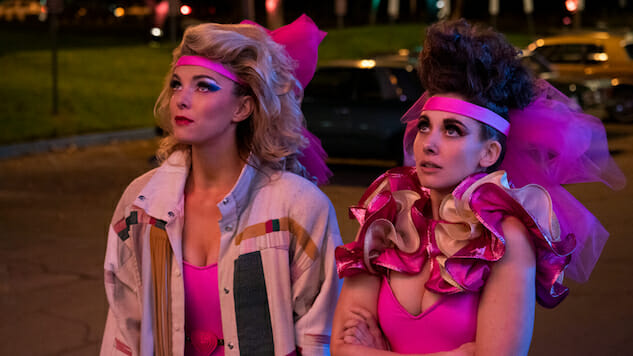GLOW Season Three Takes a Stand but Runs Out of Time
Photo Courtesy of Netflix
[This review was originally published July 19th]
The third season of Netflix’s GLOW kicks off with a very bizarre choice. Debbie (Betty Gilpin) and Ruth (Alison Brie) are being interviewed in character as Liberty Bell and Zoya the Destroyer by a local TV station in Las Vegas (where their now nightly show is taking place). It’s launch day for the space shuttle Challenger, and the two characters play up their U.S. vs U.S.S.R. rivalry by making encouraging and disparaging remarks about the shuttle in turn. Everything they say, positively or negatively, is exceptionally cringe-worthy because we know—as is revealed moments later—that the Challenger would explode, killing everyone on board. It’s GLOW!
This juxtaposition is a jarring way to start the season, but it does ultimately capture a theme that runs through the remaining nine episodes (all of which were available for review). GLOW can be and often is bubbly fun. But beneath that exterior is a more complicated truth, something that these women handle and fight through both inside and outside of the ring.
GLOW Season Three has moved the ladies of wrestling to a new venue, which gives the series a necessary refresh. And yet, it still has many of the hallmarks that made Season Two such a step up from its initial outing. The show is at its best when the women are forced to be clustered together, living in dorm-like conditions now within the hotel. The fact that the Vegas show is the same thing we saw in the Season Two finale over and over also gives the series room (in two particularly memorable occasions) to occasionally mix things up in a very meta way. (Like Season Two’s divisive Episode 8, which I personally adored.)
But for the most part, GLOW is focused on the women’s inner battles, since most of the tension among the troupe or with specific pairings has been resolved. In vignette-style stories, the show explores familial and romantic relationships alongside career worries, body image issues, addiction and emotional truths. Some of these it handles better than others, mostly due to the sprawling ensemble cast. Even having watched three seasons of the show, there are a handful of characters whose names or stage names I still don’t know. That’s ok, to some extent—not everyone can have their moment in a series that runs for ten half-hour episodes each year. But when GLOW does introduce a particularly interesting dynamic or story for its secondary or tertiary characters, it’s either resolved immediately or promptly forgotten.
-

-

-

-

-

-

-

-

-

-

-

-

-

-

-

-

-

-

-

-

-

-

-

-

-

-

-

-

-

-

-

-

-

-

-

-

-

-

-

-








































